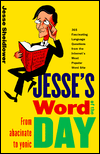Jesse's Word of the Day: www.jesseword.com
My four year-old daughter has discovered the meaning of piggyback. Can you explain its origins?\ \ When is it appropriate to use ie. and eg.?\ \ If I'm "in like Flynn" am I being compared to the actor?\ \ Everyone in my office has started saying "yada-yada-yada." I know this pre-dates Seinfeld. Where does it come from?\ \ In Jesse's Word of the Day, language expert Jesse Sheidlower offers witty and informative answers to the most interesting real-life language questions posed by visitors to...
Search in google:
My four year-old daughter has discovered the meaning of piggyback. Can you explain its origins?When is it appropriate to use ie. and eg.?If I'm "in like Flynn" am I being compared to the actor?Everyone in my office has started saying "yada-yada-yada." I know this pre-dates Seinfeld. Where does it come from?In Jesse's Word of the Day, language expert Jesse Sheidlower offers witty and informative answers to the most interesting real-life language questions posed by visitors to the popular Web site he originated with Random House. His tradition is now being continued at The Mavens' Word of the Day (www.mavensword.com).What are the origins of phrases like bated breath and skin of the teeth? What's the proper way to use confusable words like lie and lay? Are there answers to popular puzzlers about the longest word in the English language or the number of words ending in -gry? Jesse's responses to these are both authoritative and fun to read for language mavens of all levels. A fun and practical resource, Jesse's Word of the Day answers the language questions you've always pondered, and some you haven't even thought to ask! Library Journal As senior editor in charge of slang and new words for the Random House reference department, Sheidlower routinely receives language questions via E-mail, researches the answers in the department's Living Language database and other print or database resources, and responds daily on his website (). Sheidlower's alphabetical compilation of actual questions and answers from the past year and a half describes, through witty and informed examples, not only the meaning and etymology of words but their style and historical and contemporary usage as well. From "a/an" (used before words beginning with "h") to "Zeitgeist," this book is a joy to browse and a painless way to review spelling and grammar (e.g., Is it "baited breath" or "bated breath" and why?). Similar in scope to works such as Morton Freeman's Hue and Cry and Humble Pie (LJ 2/1/93), Sheidlower's book has the edge as a dynamic resource with online archives and daily supplements. This will appeal to most public and academic libraries.--Cathy Sabol, Northern Virginia Community Coll., Manassas
\ Library JournalAs senior editor in charge of slang and new words for the Random House reference department, Sheidlower routinely receives language questions via E-mail, researches the answers in the department's Living Language database and other print or database resources, and responds daily on his website (). Sheidlower's alphabetical compilation of actual questions and answers from the past year and a half describes, through witty and informed examples, not only the meaning and etymology of words but their style and historical and contemporary usage as well. From "a/an" (used before words beginning with "h") to "Zeitgeist," this book is a joy to browse and a painless way to review spelling and grammar (e.g., Is it "baited breath" or "bated breath" and why?). Similar in scope to works such as Morton Freeman's Hue and Cry and Humble Pie (LJ 2/1/93), Sheidlower's book has the edge as a dynamic resource with online archives and daily supplements. This will appeal to most public and academic libraries.--Cathy Sabol, Northern Virginia Community Coll., Manassas\ \








